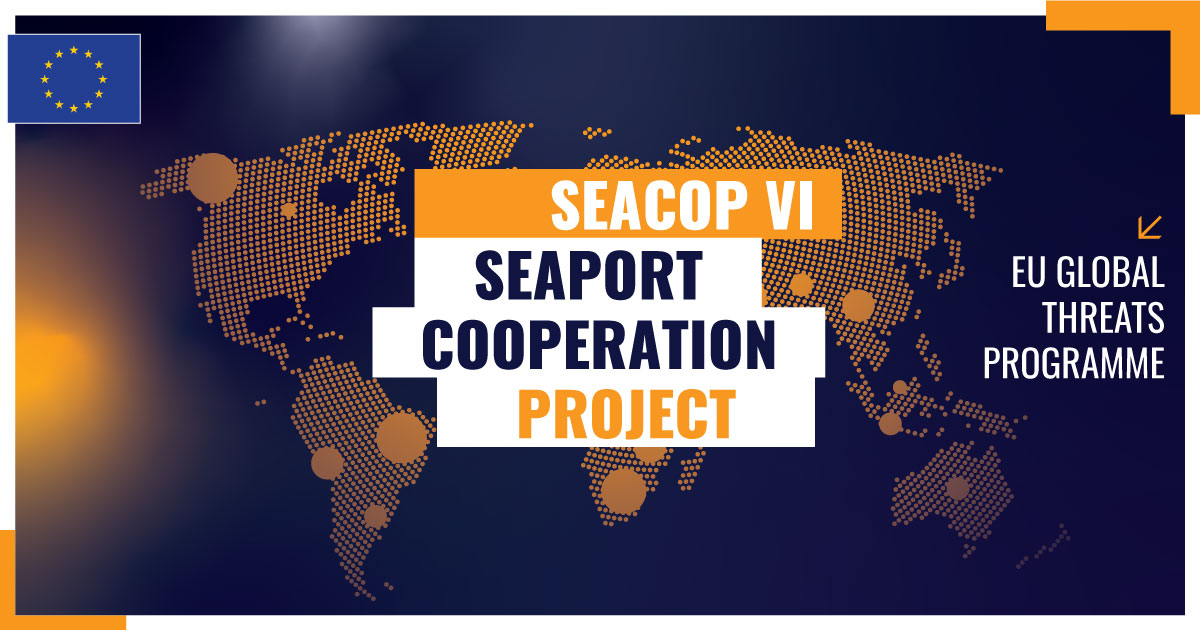
Context
Illicit trafficking is a global issue that undermines social development, public health, and governance. The transatlantic axis, stretching from Latin America through the Caribbean and West Africa to Europe, is a key route for these flows, driven by transnationalcriminal networks often linked to money laundering. With 90 % of global trade moving by sea, illicit goods are typically concealed within legitimate cargo or transported on fishing boats and yachts. Inadequate port controls and institutional gaps enable these networks to connect ports across continents, reinforcing criminal activity.
Since 2010, SEACOP has been working with relevant authorities in these regions, in close cooperation with EU agencies fighting transnational crime and ensuring border security.
Overall objective
This project aims to contribute to the fight against illicitmaritime trafficking and associated criminal networks in targeted countries of Latin America, the Caribbean and West Africa, consistent with human rights, in order to alleviate its negative impact on security, public health, the environment and socio-economic development.
Specific objectives
- To reinforce the capacities for analysis and identification of suspicious vessels and intelligence sharing related to maritime/riverine illicit trafficking, including those subject to environmental criminality
- To strengthen capacities for maritime search and interdiction of illicit commodities, including those subject to environmental criminality.
- To sustainably improve cooperation and information sharing at the regional and transregional level, including the promotion of law enforcement operations.
Concrete activities
- Launched the GRES (Special Response Group) to enhance information sharing and the exchange of best practices Latin America, West Africa, and the Caribbean.
- Developed and rolled out a comprehensive Training of Trainers (ToT) curriculum to strengthen local capacity across the three regions.
- Supported the setup and provided long-term operational support to Maritime Intelligence Units (MIUs) and Joint Maritime Control Units (JMCUs) in all regions.
- Established Operation Remora, a successful inter-regional information sharing operation between Latin America, the Caribbean, and West Africa.
- Project duration
- 1 Nov 2023 - 31 Oct 2026
- Project locations
- AnguillaAntigua and BarbudaArgentinaBarbadosBeninBrazilCabo VerdeColombiaCosta RicaCôte d’IvoireDominicaDominican RepublicEcuadorGhanaGrenadaGuyanaJamaicaMontserratParaguayPeruSenegalSierra LeoneSaint Kitts and NevisSaint LuciaSaint Vincent and the GrenadinesSurinameThe GambiaTogoTrinidad and TobagoUruguay
- Overall budget
- €6 000 000
- Threat area
- Fight against Organised Crime
Results
Expected results
- Strengthened capacities of JMCUs and MIUsof the SEACOP network on the analysis, identification and interdiction of suspicious vessels.
- Enhanced information and intelligence sharing related to maritime/riverine illicit trafficking.
- Provision of equipment for search and rummage teams, based on a needs assessment as well as access to relevant IT systems, databases and intelligence exchange platforms.
- Strengthened regional and trans-regional cooperation amongst the SEACOP network and with relevant EU agencies and projects, such as EMPACT and MAOC (N).
Achievements
Caribbean
- 13 Memoranda of Understanding (MoUs) signed, and 22 National Steering Committees held. Delivered training/mentoring courses to 1,087 officers, with 2 exercises and/or operations supported.
- 37 Caribbean law enforcement agencies have utilised SEACOP’s services, and 114 seizures were supported by teams trained by SEACOP, including of cocaine, cannabis, arms and ammunition.
West Africa
- 2 MoUs signed and 2 National Steering Committees held. Delivered 43 training/mentoring courses to 553 officers, with 6 exercises and/or operations supported.
- 21 seizures were supported by teams trained by SEACOP, including of cocaine, cannabis, ammunition and pharmaceuticals.
Latin America
- 6 MoUs signed, and 4 National Steering Committees held. Delivered 35 training/mentoring courses to a total of 795 officers, with 8 exercises and/or operations supported.
- 36 seizures were supported by teams trained by SEACOP, including of cocaine, cannabis and protected species.
Transregional
- 30 transregional activities have been organised as part of the Trans Regional Intelligence Group (TRIG+), as well as several Case and Threat Studies webinars.
- Supported a number of regional and global operations such as the Orion and Tayrona campaigns, Operation REMORA, Tradewinds exercise, and UNITY among others.
- Joint activities organised with other EU-funded projects.
